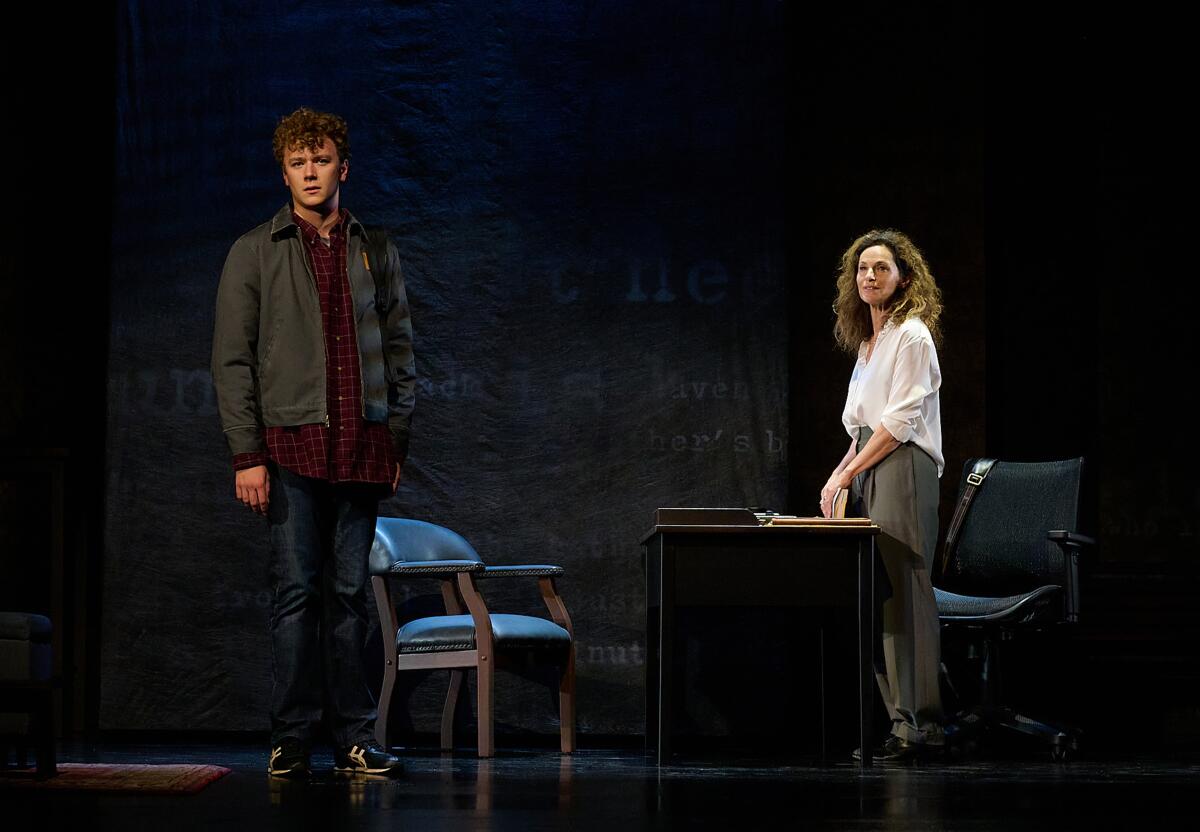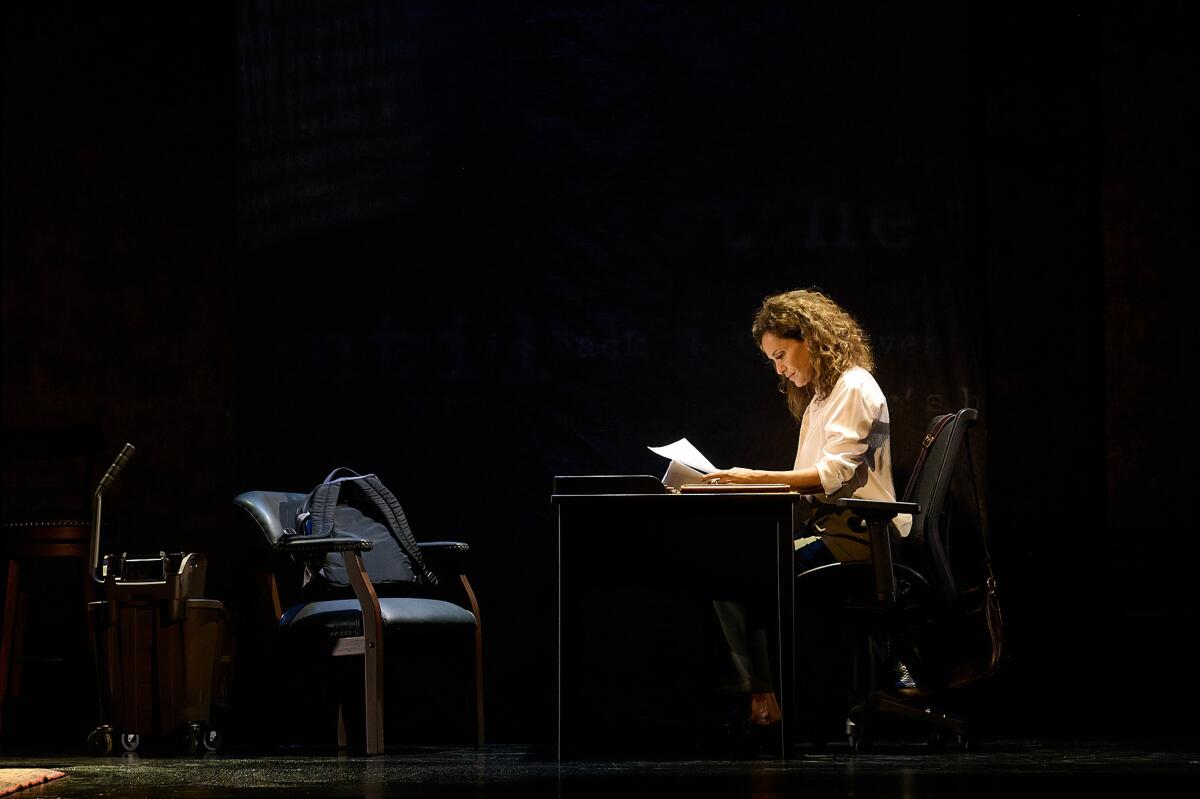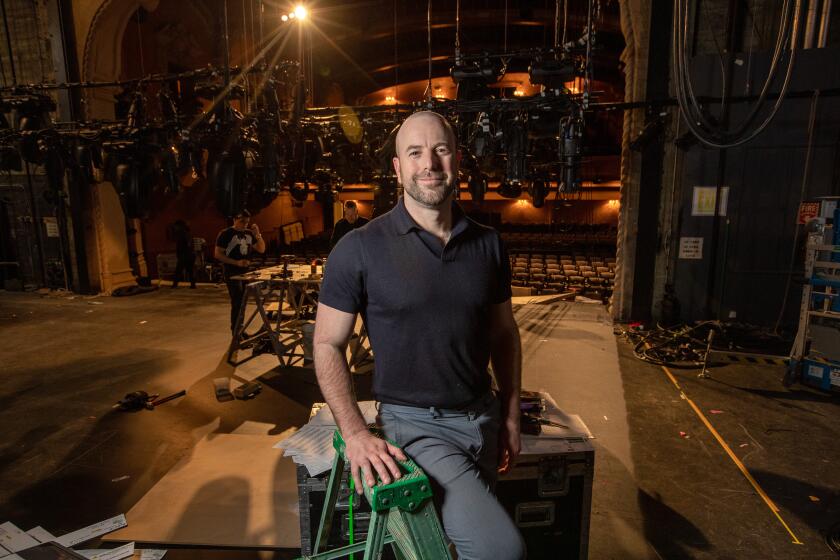Review: At Pasadena Playhouse, ‘The Sound Inside’ thrillingly unfurls like a series of puzzle boxes

- Share via
On the surface, Adam Rapp’s “The Sound Inside” seems like a straightforward two-character play that tells an ensnaring story. But the drama itself is a series of puzzle boxes. Open one and you’ll find another — each leading deeper into the mystery of art’s relationship to reality.
A prolific and fearlessly adventurous Obie-winning playwright in New York’s downtown theater scene, Rapp (whose plays include “Nocturne” and the Pulitzer Prize finalist “Red Light Winter”) has written perhaps his most accessible and entertaining drama yet with “The Sound Inside.” The play, which had its premiere at Williamstown Theatre Festival in 2018, opened on Broadway the following year, receiving several Tony nominations and a Tony win for the production’s spellbinding star, Mary-Louise Parker.
Amy Brenneman, the Emmy-nominated star of “Judging Amy,” brings her own sharp-witted charisma to the role in the play’s L.A. premiere at Pasadena Playhouse, stylishly directed by Cameron Watson. Playing Bella, a professor of creative writing at Yale University, Brenneman spends a good portion of her time addressing the audience directly with a story about one of her students, a freshman named Christopher (Anders Keith) who barges into her office one day without an appointment.
Christopher, a young would-be novelist, has the social graces of a jackhammer. He deplores social media, has renounced email and refuses to sully himself with the online departmental calendar that Bella insists her students use to make an appointment with her. At one point he spits on the floor of her office after his breathless tirade against the techno tyranny of the modern world fails to impress her — a detail that might seem a touch too strong were this a short story from a student that Bella was mentoring.
Pasadena Playhouse’s producing artistic director, Danny Feldman, has proved that growth is still possible in a time of spiraling crisis for American theater.
Bella, who’s 53 and solitary in ways that can seem extreme even in a town of bookish overachievers, takes an interest in Christopher despite his abrasive manner. She appreciates his maverick intelligence and recognizes a fellow writer who similarly suffers from alienation and unrest.
Their relationship has twists and turns that never allow an audience to get ahead of the plot. Bella would count this as a writing success. She counsels Christopher, who is working on a novella, not to worry that he doesn’t yet know what is going to happen.
“If your protagonist is leading you then you’ll likely stay ahead of your reader,” she explains.
Much of the talk is of a literary nature. She’s teaching Dostoevsky in her writing seminar and when she confers with Christopher their dialogue sounds as though they’re composing it for the page as much as for each other.
Bella, who has published two collections of short stories and an “underappreciated” novel that is in danger of going out of print, hasn’t written anything in 17 years. This is one of the mysteries about Bella that intrigues Christopher, who has read her novel and admires it greatly. He also can’t understand why she’s never been married and seems to have no friends or loved ones in her life.
Brenneman, infinitely watchable, makes Bella’s solitude more of an appealing strength than a weakness. It’s a sign of independence and commitment to her vocation rather than a pitiable condition. But her performance finds room for loneliness and the wayward longings that spring from isolation.

Early on in the play, Bella reveals her cancer diagnosis. The prognosis isn’t good. Having nursed her mother through her dying days of a different yet eerily familiar form of cancer, she is determined not to have the same tormented ending. The only person she can turn to is Christopher, who, though precocious, is still an unformed and clearly troubled teenager with more intellect than experience or judgment.
Their story, which unfolds on a labyrinth of a set by Tesshi Nakagawa that’s partitioned with scrims and forebodingly illuminated by lighting designer Jared A. Sayeg, is grippingly told. Rapp finds Bella’s subtle, perceptive and scrupulously honest voice. And in Brenneman’s portrayal, she’s sensitive without being sentimental and assured enough to be at ease with doubt.
It’s easy to see why Christopher keeps showing up at her office. His own identity is something of an enigma. He tells Bella that his mother is a prolific mystery novelist but won’t reveal the pseudonym under which she writes. The novella that he’s writing centers on a character who seems to play the victim only to turn out to be a sociopath. Could he too have a murderous dark side?
“You have yourself a nice amount of dread simmering,” Bella tells Christopher as she reads the first pages of his story. Rapp, who wrote the book for the new Broadway-bound musical adaptation of “The Outsiders,” achieves a similar effect in his play, which imbues the academic situation with dream-like suspense.
Tarell Alvin McCraney, Geffen Playhouse’s new artistic director, discusses the “calling” of theater and his vision for the future of the Westside theater.
The dying professor has our concern, though this is not a medical drama or conventional tearjerker by any means. The dread is more widespread. There’s something about this pesky freshman that doesn’t add up.
Keith, a 2022 graduate of Juilliard’s drama program who hails from Pasadena and appears in the new Paramount+ reboot of “Frasier,” lends sharper edges to the character of Christopher than Will Hochman, who held his own against the formidable Parker in New York. Keith’s Christopher, creepier and a bit clumsier, made me want to call campus security from the theater lobby.
The main effect of this slight shift in interpretation is that it focuses us more on the plot than on the play’s thematic design. “The Sound Inside” tells a story but the way it‘s told — the structure that keeps uncoiling in novel ways — is the heart and soul of a drama that asks us to reconsider the line between art and life.
The play forces us to question the identity of the author of the story that Bella is telling so enthrallingly. Like Christopher’s novella, “The Sound Inside” leaves us with “an ellipsis,” a set of dots that asks us to resolve what really happened in the writer’s room of our imaginations.
'The Sound Inside'
Where: Pasadena Playhouse, 39 S. El Molino Dr., Pasadena
When: 8 p.m. Wednesdays-Fridays, 2 and 8 p.m. Saturdays, 2 p.m. Sundays. Ends Oct.1
Tickets: Start at $35
Contact: (6260 356-7529 or www.pasadenaplayhouse.org
Running time: 1 hour, 30 minutes
More to Read
The biggest entertainment stories
Get our big stories about Hollywood, film, television, music, arts, culture and more right in your inbox as soon as they publish.
You may occasionally receive promotional content from the Los Angeles Times.













